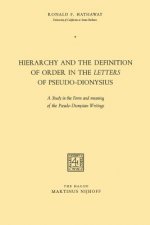
Livraison
Guide d'achat
16 124 897 livres à l’intérieur 175 langues






Afficher toutes les langues (175)
2 047 051 livres numériques à l’intérieur 101 langues






Afficher toutes les langues (101)





Cela ne vous convient pas ? Aucun souci à se faire ! Vous pouvez renvoyer le produit dans les 30 jours
 Bon d’achat
n'importe quelle valeur
Bon d’achat
n'importe quelle valeur
Impossible de faire fausse route avec un bon d’achat. Le destinataire du cadeau peut choisir ce qu'il veut parmi notre sélection.
Apophasis and Pseudonymity in Dionysius the Areopagite
 Anglais
Anglais
 502 b
502 b
 common.delivery_to
common.delivery_to
Politique de retour sous 30 jours
Ceci pourrait également vous intéresser


A PDF version of this book is available for free in open access via www.oup.com/uk as well as the OAPEN Library platform, www.oapen.org. It has been made available under a Creative Commons Attribution-Non Commercial-No Derivatives 3.0 license and is part of the OAPEN-UK research project. This book examines the writings of an early sixth-century Christian mystical theologian who wrote under the name of a convert of the apostle Paul, Dionysius the Areopagite. This 'Pseudo'-Dionysius is famous for articulating a mystical theology in two parts: a sacramental and liturgical mysticism embedded in the context of celestial and ecclesiastical hierarchies, and an austere, contemplative regimen in which one progressively negates the divine names in hopes of soliciting union with the 'unknown God' or 'God beyond being.' Charles M. Stang argues that the pseudonym and the influence of Paul together constitute the best interpretive lens for understanding the Corpus Dionysiacum [CD]. Stang demonstrates how Paul animates the entire corpus, and shows that the influence of Paul illuminates such central themes of the CD as hierarchy, theurgy, deification, Christology, affirmation (kataphasis) and negation (apophasis), dissimilar similarities, and unknowing. Most importantly, Paul serves as a fulcrum for the expression of a new theological anthropology, an 'apophatic anthropology.' Dionysius figures Paul as the premier apostolic witness to this apophatic anthropology, as the ecstatic lover of the divine who confesses to the rupture of his self and the indwelling of the divine in Gal 2:20: 'it is no longer I who live, but Christ who lives in me.' Building on this notion of apophatic anthropology, the book forwards an explanation for why this sixth-century author chose to write under an apostolic pseudonym. Stang argues that the very practice of pseudonymous writing itself serves as an ecstatic devotional exercise whereby the writer becomes split in two and thereby open to the indwelling of the divine. Pseudonymity is on this interpretation integral and internal to the aims of the wider mystical enterprise. Thus this book aims to question the distinction between 'theory' and 'practice' by demonstrating that negative theology-often figured as a speculative and rarefied theory regarding the transcendence of God-is in fact best understood as a kind of asceticism, a devotional practice aiming for the total transformation of the Christian subject.
À propos du livre
 Anglais
Anglais


 Contact
Contact Comment faire ses achats
Comment faire ses achats


























